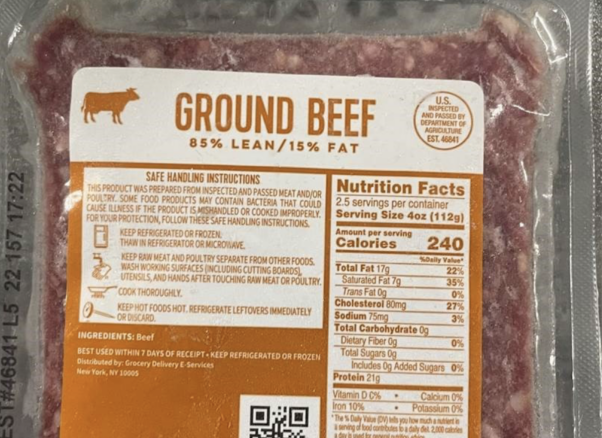FOOD SAFETY NEWS – Federal officials report a new outbreak of infections caused by E. Coli O157:H7 is linked to ground beef in HelloFresh meal kits.
No recall is being issued because the implicated ground beef is not believed to be available for sale any longer, according to the USDA’s Food Safety and Inspection Service.
However, the agency is concerned that some consumers may still have the ground beef in their freezers and has issued a public health alert.
The meal kits containing the ground beef subject to the public health alert were shipped to consumers from July 2 to July 21. The 10-ounce plastic vacuum-packed containers are 85 percent lean and have one of the following codes:
EST#46481 L1 22 155 or EST#46481 L5 22 155. The codes are on the side of the packaging. The ground beef packages also have EST.46841 printed inside the USDA mark of inspection.
According to the Food Safety and Inspection Service alert:
“Traceback information identified that multiple case-patients received ground beef produced at establishment M46841 and distributed by HelloFresh.
“Traceback of materials used to produce the ground beef is ongoing and FSIS continues to work with suppliers and public health partners on the investigation.”
The Centers for Disease Control and Prevention is working with FSIS and state health officials on the outbreak investigation, according to the public health alert. However, the CDC had not yet posted any information on the outbreak as of Sept. 11.
The FSIS did not report how many patients have been identified or where they live.
About E. coli infections
Anyone who has eaten any of the implicated products and developed symptoms of E. coli infection should seek medical attention and tell their doctor about their possible exposure to the bacteria. Specific tests are required to diagnose the infections, which can mimic other illnesses.
The symptoms of E. coli infections vary for each person but often include severe stomach cramps and diarrhea, which is often bloody. Some patients may also have a fever. Most patients recover within five to seven days. Others can develop severe or life-threatening symptoms and complications, according to the Centers for Disease Control and Prevention (CDC).
About 5 to 10 percent of those diagnosed with E. coli infections develop a potentially life-threatening kidney failure complication, known as a hemolytic uremic syndrome (HUS). Symptoms of HUS include fever, abdominal pain, feeling very tired, decreased frequency of urination, small unexplained bruises or bleeding, and pallor.
Many people with HUS recover within a few weeks, but some suffer permanent injuries or death. This condition can occur among people of any age but is most common in children younger than five years old because of their immature immune systems, older adults because of deteriorating immune systems, and people with compromised immune systems such as cancer patients.
People who experience HUS symptoms should immediately seek emergency medical care. People with HUS will likely be hospitalized because the condition can cause other serious and ongoing problems such as hypertension, chronic kidney disease, brain damage, and neurologic problems. SOURCE.



